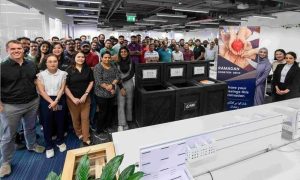Tabreed and IFC to establish district energy investment platform in Singapore
Joint venture will invest in district cooling, trigeneration and cooling as a service offering, with a primary focus on India and other SE Asian countries

National Central Cooling Company (Tabreed) and the International Finance Cooperation (IFC), a member of the World Bank Group, plan to establish a district energy investment platform in Singapore, it has been announced.
In a statement, the companies said that the platform will invest in district cooling, trigeneration and cooling as a service offering with primary focus on India followed by other South East Asian countries.
The joint venture aims to build on Tabreed’s ongoing development activities in India following the establishment of its wholly owned subsidiary in the country.
It will also seek to provide more energy efficient end to end cooling as a service offering through an outsourced utility model for real estate developments, new urban masterplans, and ongoing redevelopments across target cities, said the statement from Tabreed.
Commenting on the JV, Tabreed CEO Bader Saeed Al Lamki said: “The size and dynamism of India and other South East Asian countries will keep them at the heart of the global energy system with all roads to a successful global clean energy transition going via India. Sustainable cooling plays a crucial role in materialising this vision.”
“As a global leader in creating markets for climate businesses, we are proud to be collaborating with the IFC, who also enjoy a significant advisory and investment presence in the region to help spearhead development of district cooling and broader cooling as a service market,” he added.
Energy demand in South East Asia is growing twice as fast as the rest of the world. In India, now the world’s third largest energy consuming country, cooling continues to be the largest contributor to this growth with the Indian government’s Cooling Action Plan forecasting an eight-fold increase in demand through to 2038.
The commercial real estate sector alone is estimated to add 100 million refrigeration tonnes in capacity during this period.
Globally, district cooling and heating utilities have been providing more cost-effective low carbon pathways for cities to meet their energy needs, also accelerating the transition of green buildings to carbon net-zero buildings.
In India, however, the cooling as a service market remains in a relatively embryonic stage due to real estate developers making their own individual and varied cooling technology choices.International Finance Cooperation (IFC),

























